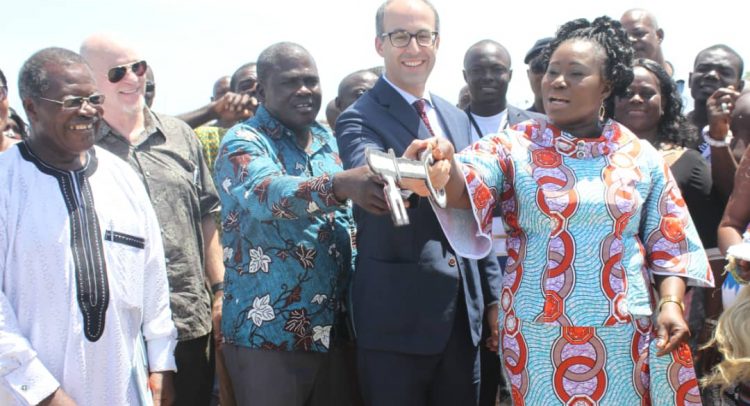Madam Afoley Quaye (right) and officials of USAID and members of the oyster association in a symbolic opening of the oyster harvest season
OYSTER FARMERS at the Densu Estuary in the Ga South Municipal Assembly of the Greater Accra Region have successfully marked the second observance of the closed season of the Densu.
The five-month closed season which started from November last year to April 2019, allowed for the oyster stocks in the Densu estuary to spawn and grow bigger before pickers around the Tsokomey, Tetegu, and Bortianor communities could harvest, thereby improving the nutritional status.
The closed season was made possible through a co-management programme introduced in 2017.
The programme is being implemented with the support of the USAID’s Feed the Future’ Sustainable Fisheries Management Programme (SFMP), the Development Action Association (DAA), a non-governmental organisation, and the Fisheries Commission.
In a short community durbar to mark the opening of the closed season of the Densu to usher in a period of oyster harvesting within the Ga South Municipal Assembly, Elizabeth Naa Afoley Quaye, Minister for Fisheries and Aquaculture Development, commended the women for showing great fortitude to support the effective and sustainable management of the oyster natural resource in the Densu.
She said based on the success of the first closed season and over a year of scientific data that was collected by the women themselves, they, decided to close the season for a second period “and today we are here to open that season”.
“By closing their oyster harvesting for a set period every year, the Oyster pickers from Tetegu, Bortianor and Tsokomey are dealing with something that currently threatens the fish stocks on which Ghanaians most depend.
“They are together addressing what is called open access fishing here in Ghana. In open access fishing, anyone can go fishing anytime, without any restrictions,” she said.
She commended the USAID Ghana for its support for the marine fisheries sector through the US Government’s Feed the Future programme, expressing the hope that such a meaningful relationship would continue in the efforts to rebuild marine fish stocks and improve the livelihoods of fishers.
“I see what you are doing here as a great positive example and success story that we as MOFAD / FC can draw lessons from in our bid to pilot co-management activities in the marine and inland fisheries of Ghana”.
Mr James G. Lykos, Acting Team Leader of the USAID Ghana Economic Growth, said the successful oyster closed season had proven that “when the responsibility for decision-making is shared between government, citizens, and other stakeholders, resource management is more effective and sustainable”.
He applauded the media’s role in highlighting the critical issues in the fisheries sector, as a good advocacy tool, for increasing public and private support for the sector, which was facing several challenges, dwindling the fish stock, and posing insecurity in the sector.
Madam Lydia Sasu, the Executive Director of the Development Action Association, urged all the community members and the traditional rulers in the area, to help sustain and continue with the oyster closed season to help beef up the stock all year round.
By Jamila Akweley Okertchiri

